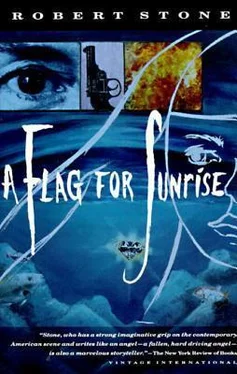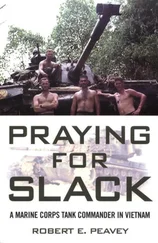Robert Stone - A Flag for Sunrise
Здесь есть возможность читать онлайн «Robert Stone - A Flag for Sunrise» весь текст электронной книги совершенно бесплатно (целиком полную версию без сокращений). В некоторых случаях можно слушать аудио, скачать через торрент в формате fb2 и присутствует краткое содержание. Год выпуска: 2012, Издательство: Vintage, Жанр: Современная проза, на английском языке. Описание произведения, (предисловие) а так же отзывы посетителей доступны на портале библиотеки ЛибКат.
- Название:A Flag for Sunrise
- Автор:
- Издательство:Vintage
- Жанр:
- Год:2012
- ISBN:нет данных
- Рейтинг книги:4 / 5. Голосов: 1
-
Избранное:Добавить в избранное
- Отзывы:
-
Ваша оценка:
- 80
- 1
- 2
- 3
- 4
- 5
A Flag for Sunrise: краткое содержание, описание и аннотация
Предлагаем к чтению аннотацию, описание, краткое содержание или предисловие (зависит от того, что написал сам автор книги «A Flag for Sunrise»). Если вы не нашли необходимую информацию о книге — напишите в комментариях, мы постараемся отыскать её.
A Flag for Sunrise — читать онлайн бесплатно полную книгу (весь текст) целиком
Ниже представлен текст книги, разбитый по страницам. Система сохранения места последней прочитанной страницы, позволяет с удобством читать онлайн бесплатно книгу «A Flag for Sunrise», без необходимости каждый раз заново искать на чём Вы остановились. Поставьте закладку, и сможете в любой момент перейти на страницу, на которой закончили чтение.
Интервал:
Закладка:
“You’re responsible for her,” Holliwell said.
“No,” said Soyer. “You are.”
The jeeps started up; a few deserted corners turned and they were climbing the tangled hill over the river. The road narrowed and descended into mangrove swamp and they could hear the sound of the ocean over their engines. Clear of the swamp they hit the beach strip. The darkness beyond their headlights was scented and absolute.
When they had driven for about twenty minutes, Holliwell found himself listening to the sound of a motorcycle somewhere ahead of them. The machine seemed to be holding a constant distance, leading them at their own speed. He began to sense the phantoms of Route Three, that paragon of war trails through night’s jungle. The escort jeep behind them followed close. Too close, Holliwell thought. At night in the jungle one always had a side to be on.
The report of the first mortar was so inevitable that Holliwell failed, in the first seconds, to take note of it. It had struck a good distance inland, far enough so that the charge echoed in the folds of the mountain wall. There was a second, then another, then the rattle of a machine gun — three long bursts. From a different quarter altogether came the single-minded wack wack wack of a rifleman with a target. The firing came in waves of varying frequency but once it started it did not stop. None of it was very close by. Through it all, Holliwell could hear the steady drone of the motorcycle ahead.
He turned toward Soyer but could not see his face for the darkness, only that the Cuban had drawn his rifle closer and that his right hand rested over the trigger housing. Lieutenant Campos turned around in the front seat as though he were about to consult with Soyer, but then turned back again to face the road in silence. Holliwell, behind the driver, had sobered to a state of tortured alert. The dreadful visit they were about had receded from his mind; he stared into the shifting dark beside the road as though he could force its secrets to his senses. He noticed that the motorcycle preceding them was no longer to be heard.
As soon as he saw the mangrove log loom across the road at the extent of the headlights’ scan he knew exactly what would come. The log blocked the road at the neck of a curve; it had never been there before. Thinking back on it just afterwards, he would convulse in horror at the time he allowed to pass between his first sighting of the barrier and his leap into darkness. But in fact there had not been much; he was rolling on the packed sand and crawling for cover well before the two jeeps pulled up short and the machine guns opened up from the bend and from the inland side of the road approaching it.
The ambush had the form of an L, as he had somehow known it would. The L’s short horizontal bar enclosed the turn parallel with the barricade, the vertical bar lined the dozen feet or so in which the vehicles would have to decelerate. The gunners had nothing but time, Holliwell thought, frantically elbowing his way over the soft sand. They would have opened up before the tires stopped rolling; before them, two excellent Detroit jeeps, packed together immobile and neatly defined in their own light like a pair of squid cooked in the ink.
There was fuck-all cover on the open beach. Pressing himself into the contours of the sand he listened wild-eyed to the devouring enfilade, the shells ringing on metal, the screams. There was no moon, the stars were faint and cold in a sky ablaze with lights and colors from behind his own eyes. In that hallucinatory darkness, he could not tell sea from shoreline or even distinguish the outline of palm groves. It seemed to him, when he thought over the instants just past, that at least one other passenger had jumped for it — it would have been seconds after his own dive. Whoever it was, if he had escaped, would be with him in the darkness now, out between the ocean and the hostiles.
The shooting on the road had stopped and he raised his head to look over his shoulder. One of the jeeps was burning; he saw a figure outlined for a moment against the flames. Men were laughing, speaking in excited voices. Two short bursts sounded — they were not taking prisoners that evening. Then the voices grew fainter as the ambush party retired, inland, toward the higher ground.
Holliwell crawled a little farther from the road and then stood up cautiously. He was about fifteen yards from the water’s edge. For a moment he stood still and listened hard — but he could hear no movement nearby, only the small waves laving the shore and the intermittent gunfire. He was alone and lost, in outer darkness without friend or faction. It was a frightening place — the point he had been working toward since the day he had come south. It was his natural, self-appointed place.
He hunkered down by the water’s edge and tried to decide on a course. He could not go back to town, both sides would be hunting him there, and now that there was blood upon the ground, explanations would not be suffered nor bargains struck. He might try to hide in the bush, where there were tiny plantation villages. But that would be unwise, he thought. They would know him for a survivor of the ambush. He would go the way of Cole.
At last he decided that he would walk to the mission. It seemed to him he had some claim on companionship there. He would tell her what had happened if he reached her in time, and if she could not or would not help him and he remained free — he might somehow lose himself among the other foreigners scavenging in the ruins there. He struck out along the shoreline.
He would not remember how long he walked before he came to the buildings at Las Ruinas. They had arranged hurricane lamps on the front steps in the form of a cross and these lights were the first he had seen since leaving Alvarado. He had followed the faint broiling glow of the tame surf, wetting his shoes, sinking, at places, to the calf in soft sand. On his left, the dark ocean played out its infinity of time; inland, men played out their lives in a less patient darkness. Where he walked was no-man’s-land. Sometimes he felt free; at other times fear overcame him, waves of fear, congruous with the rise and fall of firing. He stopped only once — to watch two helicopters swing in tandem along the mountain slope, made visible for a moment in their searchlights.
In the cover of the mission boathouse, he stopped and tried to spy out the state of things. Thin lines of light showed behind the fastened shutters of the dispensary wing but the rest of the building was dark beyond the span of lamps along the stairs. He could hear voices and laboring footsteps on the veranda. The arc of a tossed cigarette appeared for a second at the window of the priest’s apartment. There were two dark pickup trucks parked along the road out front.
He moved away from the boathouse and had started to advance along the beach when he saw two dead men at the water’s edge. One lay face up with his arms outstretched as though he had rolled off the dock; his chest was destroyed. The other was on his knees, a bloodied face half buried in sand. The two dead men wore the helmets and camouflage fatigues of the Guardia. Holliwell paused for a moment and then walked on. He would be visible from the building now. He took the chance.
Shadows appeared suddenly from the tree line by the mission garden. Someone shouted. A burst of machine-gun fire exploded from the edge of the veranda and he threw himself to the sand. The firing was in his direction but aimed high. Armed men were advancing from the woods around the garden, but they were civilians, he saw, not Guardia.
“May!” he shouted. He could feel a line of guns turn on him.
A lone man in dark slacks walked from the road and across the beach toward him.
“That you, Holliwell?” the man asked. It was Father Egan.
Читать дальшеИнтервал:
Закладка:
Похожие книги на «A Flag for Sunrise»
Представляем Вашему вниманию похожие книги на «A Flag for Sunrise» списком для выбора. Мы отобрали схожую по названию и смыслу литературу в надежде предоставить читателям больше вариантов отыскать новые, интересные, ещё непрочитанные произведения.
Обсуждение, отзывы о книге «A Flag for Sunrise» и просто собственные мнения читателей. Оставьте ваши комментарии, напишите, что Вы думаете о произведении, его смысле или главных героях. Укажите что конкретно понравилось, а что нет, и почему Вы так считаете.












